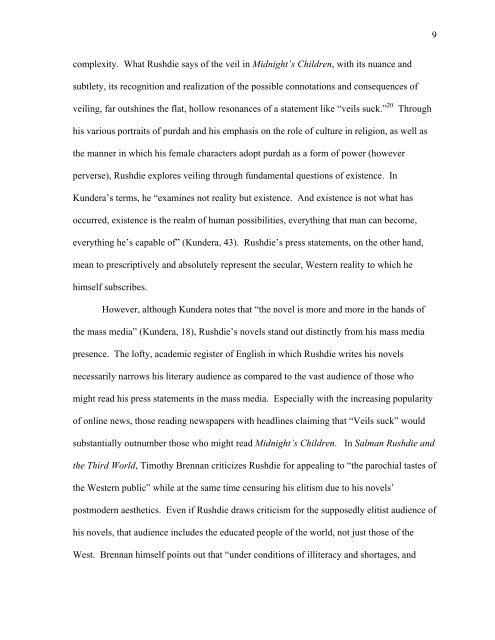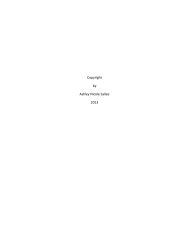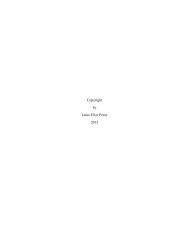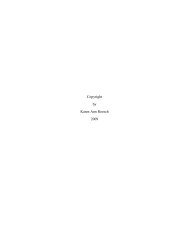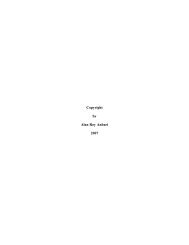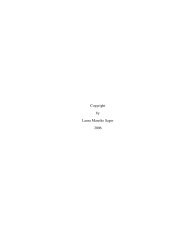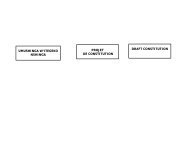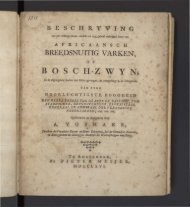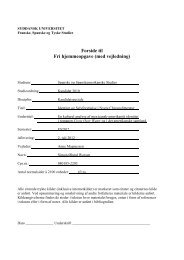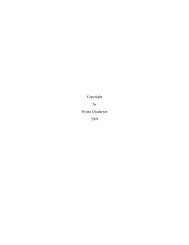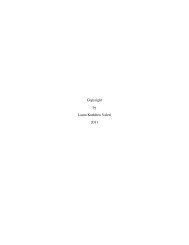The Secret Society: Descendants of Crypto-Jews in the San Antonio ...
The Secret Society: Descendants of Crypto-Jews in the San Antonio ...
The Secret Society: Descendants of Crypto-Jews in the San Antonio ...
Create successful ePaper yourself
Turn your PDF publications into a flip-book with our unique Google optimized e-Paper software.
9<br />
complexity. What Rushdie says <strong>of</strong> <strong>the</strong> veil <strong>in</strong> Midnight’s Children, with its nuance and<br />
subtlety, its recognition and realization <strong>of</strong> <strong>the</strong> possible connotations and consequences <strong>of</strong><br />
veil<strong>in</strong>g, far outsh<strong>in</strong>es <strong>the</strong> flat, hollow resonances <strong>of</strong> a statement like “veils suck.” 20<br />
Through<br />
his various portraits <strong>of</strong> purdah and his emphasis on <strong>the</strong> role <strong>of</strong> culture <strong>in</strong> religion, as well as<br />
<strong>the</strong> manner <strong>in</strong> which his female characters adopt purdah as a form <strong>of</strong> power (however<br />
perverse), Rushdie explores veil<strong>in</strong>g through fundamental questions <strong>of</strong> existence. In<br />
Kundera’s terms, he “exam<strong>in</strong>es not reality but existence. And existence is not what has<br />
occurred, existence is <strong>the</strong> realm <strong>of</strong> human possibilities, everyth<strong>in</strong>g that man can become,<br />
everyth<strong>in</strong>g he’s capable <strong>of</strong>” (Kundera, 43). Rushdie’s press statements, on <strong>the</strong> o<strong>the</strong>r hand,<br />
mean to prescriptively and absolutely represent <strong>the</strong> secular, Western reality to which he<br />
himself subscribes.<br />
However, although Kundera notes that “<strong>the</strong> novel is more and more <strong>in</strong> <strong>the</strong> hands <strong>of</strong><br />
<strong>the</strong> mass media” (Kundera, 18), Rushdie’s novels stand out dist<strong>in</strong>ctly from his mass media<br />
presence. <strong>The</strong> l<strong>of</strong>ty, academic register <strong>of</strong> English <strong>in</strong> which Rushdie writes his novels<br />
necessarily narrows his literary audience as compared to <strong>the</strong> vast audience <strong>of</strong> those who<br />
might read his press statements <strong>in</strong> <strong>the</strong> mass media. Especially with <strong>the</strong> <strong>in</strong>creas<strong>in</strong>g popularity<br />
<strong>of</strong> onl<strong>in</strong>e news, those read<strong>in</strong>g newspapers with headl<strong>in</strong>es claim<strong>in</strong>g that “Veils suck” would<br />
substantially outnumber those who might read Midnight’s Children. In Salman Rushdie and<br />
<strong>the</strong> Third World, Timothy Brennan criticizes Rushdie for appeal<strong>in</strong>g to “<strong>the</strong> parochial tastes <strong>of</strong><br />
<strong>the</strong> Western public” while at <strong>the</strong> same time censur<strong>in</strong>g his elitism due to his novels’<br />
postmodern aes<strong>the</strong>tics. Even if Rushdie draws criticism for <strong>the</strong> supposedly elitist audience <strong>of</strong><br />
his novels, that audience <strong>in</strong>cludes <strong>the</strong> educated people <strong>of</strong> <strong>the</strong> world, not just those <strong>of</strong> <strong>the</strong><br />
West. Brennan himself po<strong>in</strong>ts out that “under conditions <strong>of</strong> illiteracy and shortages, and


